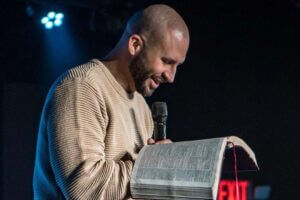Data released recently from the Cultural Research Center (CRC) at Arizona Christian University (ACU) revealed not only that America’s preteens are confused by the contradiction between their parents’ actions/lifestyles and their self-identified Christian beliefs, but a staggering disparity between the number of parents who claim to be Christian (67%) and those who actually possess a biblical worldview (2%).
So, what do the parents of America’s preteens actually believe, and what effect is it having on the next generation?
Research released today by the CRC revealed the following:
Just one-half of self-described Christian parents accept the Bible as the true and trustworthy words of God.
Only one out of every three parents of preteens believes their eternal destiny is dependent upon Jesus Christ alone.
Fewer than one in five parents believes that success is best defined as consistently obeying God’s laws and commands.
Merely one out of every three parents of preteens relies upon the Bible as their primary source of moral guidance.
Three-quarters of parents of preteens dismiss the existence of God’s change agent, the Holy Spirit.
Only 31% of self-identified Christians who are raising children under 13 believe that life is sacred.
So how is it that in a nation that has prided itself on being the centerpiece of global Christianity, an overwhelming majority of self-identified Christian parents have drifted into what CRC Director of Research Dr. George Barna defines as “syncretism” — a worldview that merges otherwise incompatible philosophies of life into a made-to-order worldview that incorporates enough biblical elements to be minimally Christian in nature?
One needs look no further than the American church, Barna says, which has not only lowered the entry bar so much that it is difficult to identify any beliefs that disqualify one from claiming to be Christian, but all the while, been measuring the wrong indicators, despite the red flags in their congregations and the culture at large.
“By emphasizing measures such as church attendance and participation in prayer and other activities, the emphasis is placed upon the amount rather than quality of spiritual activity, and on overt participation rather than core developmental efforts,” Barna says. “In other words, the emphasis is placed upon breadth rather than depth. But even more significantly, the spiritual warning signs have been misinterpreted. By looking for glaring deficiencies in the lives of self-described Christians, leaders have ignored the importance of numerous, less noticeable deficiencies.”
Parents of children under the age of 13, he claims, are a stellar example of this Christian nominalism that has become so widely accepted as spiritually normal and healthy — and the effects are far-reaching.
“Data shows that the disinterest and even disrespect many children show to their elders is partially a reaction to the lack of authenticity and integrity they experience in the presence of parents, teachers, pastors and other cultural leaders. Children sometimes feel compelled to ignore adults whose talk and walk are inconsistent,” he says. “When they’re exposed to teaching — through words or actions, whether formal or informal — that are contradictory, they naturally conclude that the Christian faith is inherently contradictory and therefore may not be what they are seeking as a life philosophy.”
Among the most glaring contradictions, according to the CRC, are the following:
Among preteen parents who believe in the God of the Bible:
One out of every four do not bother to praise, worship or thank God during a typical week.
Among the parents who believe that the purpose of their life is to know, love and serve God with all their heart, mind, strength and soul:
Less than half (41%) also believe that success is best defined as consistent obedience to God.
Among those who stated that human life is sacred:
Nearly four out of 10 accepted the moral choice to have an abortion if raising the child would be too inconvenient or uncomfortable for the parents.
Given the significance of such contradictions, Barna says, it is no wonder that children are looking to sources other than their parents for their life lessons.
“Millions of parents are clearly confused about who they are and what they believe … and in their efforts to shape their children, they can only give what they have. Many children, however, are not interested in receiving a scrambled philosophy of life. If ever there was a time when our nation was desperate for a grassroots spiritual revival led by the remnant in the pews who still revere God, Jesus Christ, the Bible and truth … now is that time.”
The Cultural Research Center at Arizona Christian University in Glendale, Arizona, conducts the annual American Worldview Inventory, other nationwide surveys regarding cultural transformation, and worldview-related surveys among the ACU student population. The groundbreaking ACU Student Worldview Inventory is administered to every ACU student at the start of each academic year, and a final administration is undertaken among students just prior to their graduation, enabling the university to track and address the worldview development of its students.
CRC is guided by George Barna, Director of Research, and Tracy Munsil, Executive Director. Like ACU, CRC embraces biblical Christianity. The Center works in cooperation with a variety of Bible-centric, theologically conservative Christian ministries and remains politically non-partisan. Access to the results from past surveys conducted by CRC and information about the Cultural Research Center is accessible at www.culturalresearchcenter.com. Further information about Arizona Christian University is available at www.arizonachristian.edu.
Read articles like this one and other Spirit-led content in our new platform, CHARISMA PLUS.
See an error in this article?
To contact us or to submit an article





















